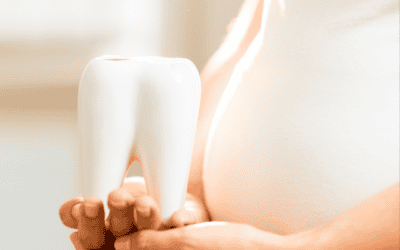A cancer diagnosis can be an incredibly overwhelming experience. Between managing medical treatments, appointments, and the emotional weight of the situation, it’s understandable that some things may slip through the cracks. One important aspect often overlooked is oral health. However, maintaining your dental care throughout cancer treatment is crucial, especially during chemo and if you are taking medications like bisphosphonates, which can affect your mouth in significant ways.
In this updated blog, we’ll talk about why it’s so important to visit your dentist before, during, and after cancer treatment, including how certain treatments can impact your oral health. By addressing potential dental issues early, you can avoid complications that might disrupt your treatment and ensure your mouth stays healthy throughout your cancer journey.
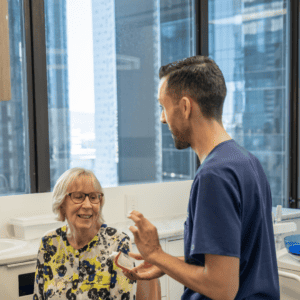
Why You Should See a Dentist Before, During, and After Cancer Treatment
According to the Cancer Council, one in two Australians will be diagnosed with cancer by the age of 85. As difficult as it may be, it’s important to understand that a dentist plays a key role in cancer treatment. For example, a dentist can spot signs of oral cancer early, identify any pre-cancerous conditions, and help manage the side effects of cancer treatments.
Here’s why seeing a dentist at each stage of your cancer journey is essential:
- Pre-Treatment Check-Up: Before you start cancer treatment, seeing your dentist for a full check-up is essential. Cancer treatments, including chemotherapy, radiation, and certain medications, can significantly affect your mouth. By visiting your dentist beforehand, you can address any potential issues, like tooth decay or gum disease, and make a plan for any dental work that might be needed before you start your treatment. This proactive approach can help prevent infections, pain, or dental complications down the line.
- During Treatment: Cancer treatments can cause a variety of oral health problems. Side effects like dry mouth (xerostomia), mouth sores, difficulty swallowing, and an increased risk of infection can be common. Regular dental visits during treatment can help address these problems early, reducing the risk of complications. For example, dentists can recommend specific mouthwashes to manage dry mouth or perform regular cleanings to prevent infection.
- Post-Treatment: Once your cancer treatment is over, ongoing dental care remains crucial. Radiation therapy, chemotherapy, and certain medications can leave long-term effects on your oral health, such as damage to the salivary glands or an increased risk of cavities. Continuing with regular check-ups will help keep your mouth healthy, monitor any changes, and address any ongoing issues that may arise as a result of treatment.
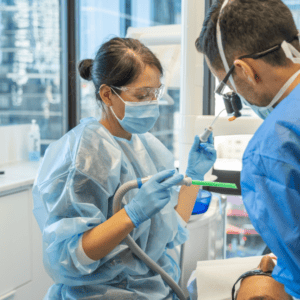
How Cancer Treatment Can Affect the Mouth
Different types of cancer treatments have different effects on the mouth. Here’s how chemotherapy, radiation therapy, and other treatments can impact your oral health:
- Radiation Therapy to the Head and Neck: Radiation can reduce blood supply to the jawbones, making it harder for them to heal if an infection occurs. It can also damage the salivary glands, leading to dry mouth, which increases the risk of cavities and gum disease. Additionally, those who undergo radiation in the head and neck region are at risk of osteoradionecrosis (ORN), a condition where the jawbone dies due to insufficient blood flow. It’s crucial to see your dentist before starting any radiation therapy to the head and neck, and also to let your medical team know if you’ve had any teeth removed in the 4 weeks before your radiation treatment.
- Chemotherapy: Chemotherapy targets rapidly dividing cells, which can lead to damage to the healthy cells in your mouth, causing sores, ulcers, and discomfort. It can also reduce your sense of taste, cause dry mouth, and increase the risk of oral infections. When your immune system is compromised due to chemotherapy, dormant infections in your mouth could flare up, potentially leading to complications that delay or disrupt your cancer treatment.
Bisphosphonates and Their Impact on Oral Health
Bisphosphonates are commonly prescribed to treat cancer-related bone issues, such as bone metastases or bone pain. These medications help prevent fractures and manage pain by reducing bone loss. However, they can have side effects on your mouth, most notably osteonecrosis of the jaw (ONJ), a condition where the jawbone starts to deteriorate. This condition is more likely to occur if you undergo invasive dental treatments (like tooth extractions or implants) while on bisphosphonates.
Because of this, it’s crucial to see your dentist before starting bisphosphonates. Your dentist will assess your oral health, provide preventive care, and address any existing issues. This way, you can reduce your risk of developing ONJ and ensure your mouth remains healthy throughout your treatment. It’s important to let your medical team know if you have had any teeth removed in the 4 weeks prior to starting on bisphosphonates.
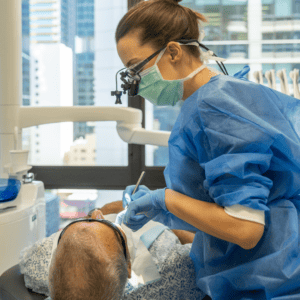
Why Ongoing Dental Visits Are Vital
Cancer treatment can lead to a variety of oral health challenges. Here are some of the most common issues and how your dentist can help:
- Dry Mouth: Many cancer treatments can cause dry mouth, which makes it difficult to eat, talk, and swallow. It also increases the risk of tooth decay and gum disease. Your dentist can provide treatments like fluoride therapy, saliva substitutes, or mouthwashes to help alleviate dry mouth symptoms.
- Increased Risk of Infection: With treatments like chemotherapy and radiation, your immune system may be compromised, making it easier for infections to take hold. A dentist can identify early signs of infection and treat them promptly to prevent them from becoming more serious.
- Difficulty Eating and Talking: Mouth sores, ulcers, and a dry mouth can make eating and speaking painful. A dentist can recommend products to soothe these symptoms, such as gels or mouthwashes, and suggest dietary changes to help manage discomfort.
- Preventive Care: Regular dental cleanings and fluoride treatments are essential during cancer treatment. Dentists can apply high-strength fluoride varnishes to help protect your teeth from decay and provide professional cleanings to prevent gum disease.
How a Dentist Can Help During Treatment
A dentist’s primary goal is to keep your mouth healthy and free of infection during cancer treatment. They will:
- Conduct regular check-ups to monitor your oral health
- Provide professional cleanings and fluoride treatments
- Treat any issues, such as sores or infections, promptly
- Offer advice on how to care for your mouth at home, including tips for managing dry mouth and preventing cavities
For those who wear dentures, a dentist can help manage any discomfort or fit issues that may arise during treatment.
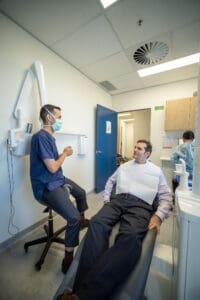
Final Thoughts
Cancer treatment takes a toll on the body, and the mouth is no exception. Whether you are taking bisphosphonates, undergoing chemotherapy, or receiving radiation, it’s crucial to prioritize dental care throughout your treatment. By seeing your dentist before, during, and after treatment, you can ensure your oral health is monitored and managed, reducing the risk of complications and helping you stay comfortable throughout your cancer journey.
Taking a proactive approach to your dental health not only helps prevent infections and discomfort but also supports your overall well-being as you navigate through your treatment. Don’t overlook the importance of dental care — it could make all the difference in keeping your mouth healthy and helping your treatment go smoothly.
For more information, you can also refer to the Cancer Council’s “Mouth Health and Cancer Treatment” resource here.
If you are a new patient to our practice, check out our new patient offers here.



